Photographs: Kevin Lamarque/Reuters
As the clamour in the United States Congress to cut off aid to Pakistan -- or at the very least suspend the massive American economic and military largesse to Islamabad --continued to grow to a crescendo, the top civilian and military leadership at the Pentagon warned against such punitive action, saying it would be counterproductive and inimical to US's security interests.
The demand to cut off aid comes in the wake of overwhelming perception that Pakistan may have been harbouring Osama bin Laden who was killed by US Navy SEALS on the outskirts of Islamabad.
Both Defence Secretary Robert Gates and Admiral Mike Mullen, chairman of the joints chiefs of staff, in a joint appearance at a special Pentagon briefing on Wednesday, went out of their way to maintain that the US had absolutely no evidence that the hierarchy of the Pakistan military or intelligence were aware that bin Laden had been living for years right under their noses in the garrison town of Abbottabad.
Gates said, "I have seen no evidence at all that the senior leadership knew. In fact, I've seen some evidence to the contrary, and we have no evidence yet with respect to anybody else. (But) My supposition is somebody knew."
Reportage: Aziz Haniffa in Washington, DC
'The top leadership didn't know'
Image: Students hold up anti-American placards during a rally in LahorePhotographs: Mohsin Raza/Reuters
When Gates was pressed on his supposition that someone within the Pakistani government knew about bin Laden's presence and if Islamabad shouldn't pay a price for such complicity if it is indeed playing a double game, Gates said that he believed Pakistan has already paid a price for this humiliation.
"If I were in Pakistani shoes, I would say, I've already paid a price. I've been humiliated. I've been shown up that the Americans can come in here and do this with impunity and we have to recognise that they see a cost in that and a price that has been paid," he said.
'Internal soul searching' in Pak army
Image: Pakistani army commandos participate in the National Day parade in IslamabadPhotographs: Mian Khursheed/Reuters
"So, if the senior leadership didn't know, it's hard to hold them accountable for it," he emphasised.
Mullen said, "'I don't think we should underestimate how humbling that this experience," has been for the Pakistani military and intelligence, and noted that there was much "internal soul searching that is going on inside the Pakistani military right now."
He said that "their image has been tarnished and they care -- as we all do -- and they care a lot about that. They are a very proud military."
He acknowledged that "actions need to be taken and so, we'll see specifically. But, I think most of the focus right now is that internal focus to address the challenge, 'How did this happen and what should we do about it?'"
'We need to give them some time'
Image: Pakistani Army Chief General Ashfaq Parvez KayaniPhotographs: Reuters
"From the standpoint of the relationship and in my discussions since the raid with General Kayani and other senior leaders, reaffirms the desire to have a relationship," he said. "But we both recognise it is going through a very difficult time right now. So the specific steps that we need to take are yet to be determined."
Mullen argued, "We need to give them some time and space to work on some of the internal challenges."
Earlier, he had said that "it would be a really significantly negative outcome if the relationship got broken. And so, from my perspective, that investment brought us to this position, which I think we need to leverage the relationship, not just in my level with the military, but quite frankly, between the two countries."
'We have significant interests in Pakistan'
Image: US Senator John Kerry with Pakistan's Interior Minister Rahman MalikPhotographs: Mian Khursheed/Reuters
"That said," the defence secretary argued, "we have to proceed with some caution. We have significant interests in Pakistan. My own view would be that we need to continue the assistance that we have provided -- it benefits the Pakistani people."
When reporters persisted and told him about the frustration of the US lawmakers as well as American taxpayers that while the US provides Pakistan with massive aid, that country continues to provide safe havens to the leadership of the Taliban and the Haqqani network that were attacking American troops, Gates said, "Of course, I understand that frustration and I share it."
He said, "The Pakistanis over the last couple of weeks have expressed the view that they are willing to go after some of these people and that we should not repeat the bin Laden operation because they will undertake this themselves."
Gates predicted that "this provides us an opportunity and I think we ought to take them up on that. And, it also offers them an opportunity to address this frustration and the skepticism that I referred to."
'Safe havens have to be eliminated'
Image: Some of the items recovered from a house in Peshawar, believed to be a warehouse of Haqqani networkPhotographs: Ali Imam/Reuters
"We all need to make sure that they understand that this priority isn't going to go away and the safe havens for these leaders have to be eliminated," he added.
Mullen was opposed to conditioning US aid to Pakistan handing over the Haqqani network to the US, saying, "Our approach needs to continue to be with Pakistan, a very comprehensive approach across the totality of government than picking an individual string that says this is how we are going to do it."
He acknowledged that the resources that are being provided to Pakistan "are considerable and so it's understandable that there would be those that would look at that, and I understand that and quite frankly, the Pakistani leadership, the military leadership in particular, would understand that."

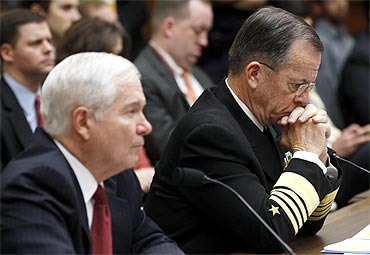
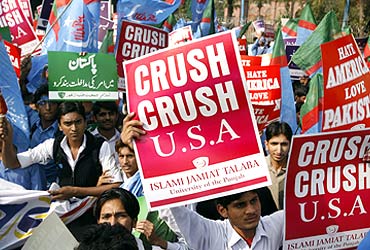
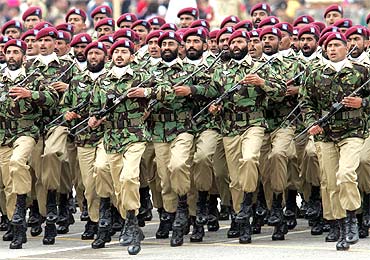
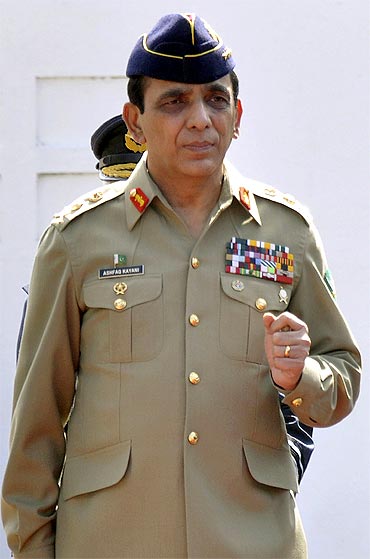
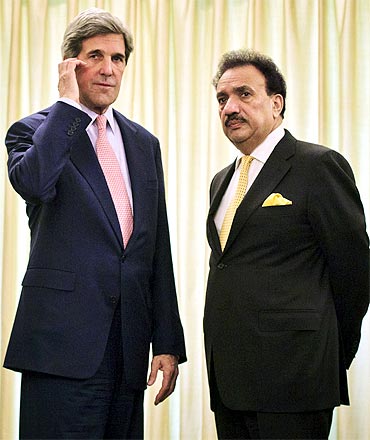
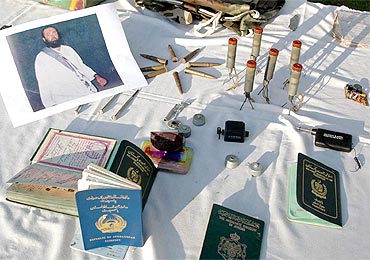
article